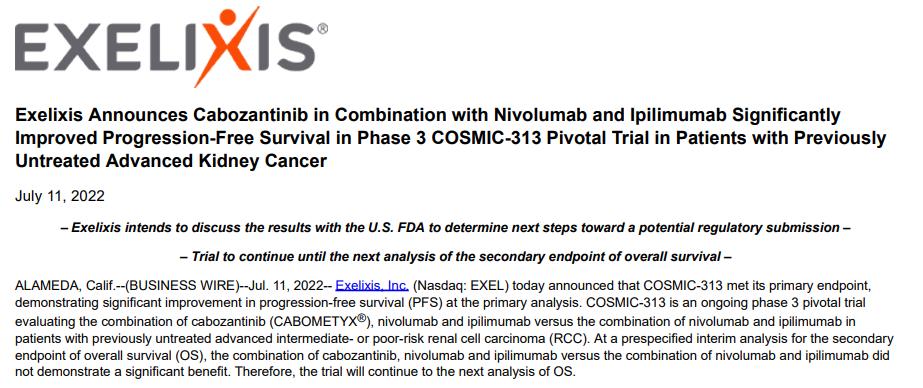Exelixis Announces Cabozantinib in Combination with Nivolumab and Ipilimumab Significantly Improved Progression-Free Survival in Phase 3 COSMIC-313 Pivotal Trial in Patients with Previously Untreated Advanced Kidney Cancer
On July 11, Exelixis announced that its Phase III COSMIC-313 clinical trial of cabozantinib (cabozantinib) in combination with Nivolumab (nivolumab) and ipilimumab (ipilimumab) in patients with advanced renal cell carcinoma reached primary The endpoint, showed a significant improvement in progression-free survival (PFS) in the primary analysis.
According to 2022 statistics from the American Cancer Society, kidney cancer is one of the top ten most common cancers in the United States. Renal cell carcinoma (renal cell carcinoma for short) is a highly malignant tumor in the urinary system, and its global incidence accounts for about 2% to 3% of adult malignant tumors. Renal cancer is a malignant tumor originating from the renal parenchymal urinary tubule epithelial system, also known as renal adenocarcinoma, accounting for 80% to 90% of renal malignant tumors. The most common histopathological type of renal cell carcinoma is clear cell carcinoma, followed by papillary renal cell carcinoma and chromophobe cell carcinoma, as well as rare types of renal cell carcinoma such as collecting duct carcinoma. Renal cancer patients have a high 5-year survival rate if detected at an early stage, whereas patients with advanced or advanced metastatic renal cancer have a 5-year survival rate of only 14%, and they urgently need first-line treatment options.
Cabozantinib is a small molecule multi-target oral tyrosine kinase (TKI) inhibitor, which can inhibit the multi-target tyrosine kinase activity of VEGFR-1-3, C-MET, AXL, KIT, RET, FLT3, TIE-2 . Its tablets were first launched in the United States in 2012 and have been approved for the treatment of medullary thyroid cancer; patients with advanced renal cell carcinoma and patients with hepatocellular carcinoma who have previously received sorafenib; and in combination with nivolumab, First-line treatment of advanced renal cell carcinoma. Cabozantinib is currently approved for marketing in the EU and other countries and regions around the world.
COSMIC-313 is a multicenter, randomized, double-blind, controlled Phase III pivotal trial that enrolled 855 patients with advanced intermediate- and high-risk renal cell carcinoma. The experimental group received cabozantinib in combination with Nivolumab and Ipilimumab, and the control group received placebo in combination with Nivolumab and Ipilimumab. The primary endpoint was progression-free survival (PFS), and the secondary endpoint was overall survival (OS). Nivolumab and Ipilimumab were provided by BMS.
The results of the preliminary analysis showed that compared with the control group, the PFS of the experimental group was significantly improved, and the risk of disease progression or death in the experimental group was significantly reduced (HR: 0.73; 95% CI: 0.57-0.94; P=0.01). The interim analysis of OS, a prespecified secondary endpoint, did not show a significant benefit. Therefore, this trial will continue until the next OS analysis.
Toni Choueiri, MD, director of the Lank Center for Genitourinary Oncology at Dana-Farber Cancer Institute and the Jerome and Nancy Kohlberg Professor of Medicine at Harvard Medical School, said: “As the treatment environment continues to evolve, patients with advanced kidney cancer have more and more treatment options, but There remains a need for more effective first-line treatment options for intermediate and high-risk patients. Preliminary results from COSMIC-313 suggest that cabozantinib in combination with Nivolumab and ipilimumab may be a potential option for this patient population.”
“COSMIC-313 is the first to demonstrate that the addition of a tyrosine kinase inhibitor to dual checkpoint inhibition improves survival in patients with advanced kidney cancer,” said Vicki L. Goodman, Ph. A trial of progression survival.”









